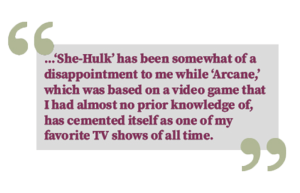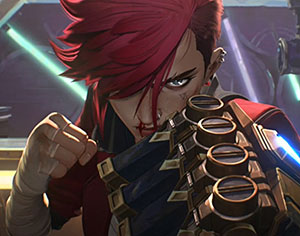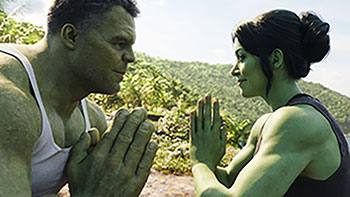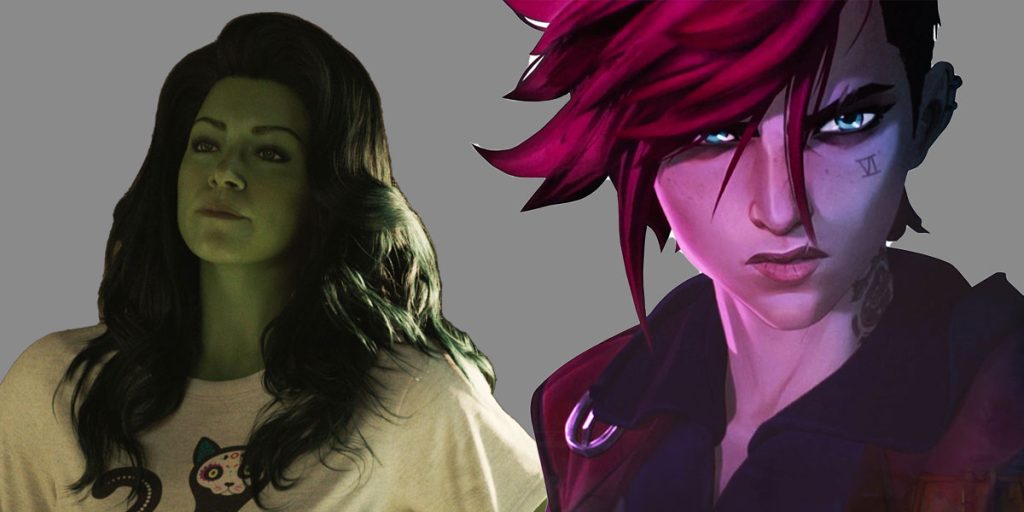Although Arcane and She-Hulk differ in style and tone, they both aim to portray their respective female leads as strong characters worthy of audiences’ attention spans. However, Arcane accomplishes this task while She-Hulk fails, and the defining reason is found within the portrayal of their main characters.
She-Hulk (left) and Vi (right) are two strong female characters who are elevated in different ways within their respective shows. “Arcane” is on Netflix, while “She-Hulk” airs on Disney Plus. Photos courtesy of Marvel Studios and Riot Games
__________________________________________________
“Arcane” and “She-Hulk” seem totally different at first glance, but their similarities become more apparent upon further investigation.

“Arcane,” a dystopian fantasy video game adaptation, was one of Netflix’s surprise TV show hits of 2021, garnering the attention of millions for its stunning animation, popular soundtrack, and compelling storyline.
“She-Hulk” is Disney Plus’ latest attempt at adapting another little-known Marvel comic book heroine for the small screen. An ongoing series, the 2022 show features callbacks to the previous movies as well as new characters in hopes of expanding the already-massive Marvel Cinematic Universe.
Despite the popularity to which it was attached through its source material, “She-Hulk” has been somewhat of a disappointment to me while “Arcane,” which was based on a video game that I had almost no prior knowledge of, has cemented itself as one of my favorite TV shows of all time.
The singular reason behind these statements lies with the main characters of each show: Vi and Jinx in “Arcane” and Jennifer Walters in “She-Hulk.”
Based on the titular characters in the popular game “League of Legends,” Vi (voiced by Hailee Steinfeld) and Jinx (voiced by Ella Purnell) belong to the steampunk world of Piltover, where they both aim –through different means – to bring freedom and fairness to their people, the poor and oppressed of Zaun.
Vi bears more responsibility in the show because as the elder, she must take care of Jinx in the beginning episodes. As the show progresses and disaster strikes, Jinx and Vi are separated and begin their separate paths toward the same goal.

What makes their story so compelling is the raw emotion etched in the animation and scripted into the storyline. The audience is split between Vi and Jinx.
Both characters have major flaws. Each has hurt the other in unimaginable ways. And yet, I found myself empathizing with each character as each has suffered to become what they are at the end of the show.
Both Vi and Jinx have believable character arcs that make sense considering what they experienced.
Jinx’s madness arc doesn’t seem inconceivable because the audience watched her lose her parents to Piltover guards and witnessed her view of the aftermath of a battle where Vi abandoned her as a result of her unintentional involvement in the deaths of her friends and adoptive father figure.
In stark contrast, the character development of Jenifer Walters, the alter ego of She-Hulk played by Tatiana Masany, seems lackluster.
She does not seem to have any trouble adapting to newly acquired powers that took her cousin Bruce Banner (Mark Ruffalo) – you may know him as the Hulk on the Avengers – years to master.
Although there is initial shock, she has no problems completing tasks Banner assigns to gauge her new superhuman abilities. She even outperforms the Hulk in several competitions, days after the life-changing accident and with no prior training.

Not only does this seem out of character for Marvel, who took several trilogies to fully flesh out characters pre-Endgame, but it also does a disservice to fans who have been waiting for strong female characters to enter the MCU.
The strength and power of She-Hulk come at a large cost to the intelligence and importance of Bruce Banner’s Hulk.
While the main focus of “She-Hulk” is not her origin but her life after, it is frustrating to watch her adapt to powers so quickly when we have seen and heard of the trials of adapting to newfound strengths and responsibilities for the original avengers.
There is definitely merit in arguing that “She-Hulk” is aiming to break new ground for Marvel by focusing on female-driven storylines instead of male-centric stories like previous movies and shows like ”The Avengers” and “Daredevil.”
However, “Arcane” proves that you can tell a story centered on not one, but two strong female characters without demeaning the male characters of the show.
“Arcane” also focuses on life after the origins of each character without ignoring the impact on the characters’ psyche. Through motivations, montages and memories, Vi and Jinx are evolving throughout the show before the audience’s eyes without diminishing the role of the opposite sex in the story.
Although there are vast differences in tone and cinematic style, “Arcane” and “She-Hulk” serve as contrasts for the other, one highlighting female characters in conjunction with male characters and the other raising female at the expense of male.
